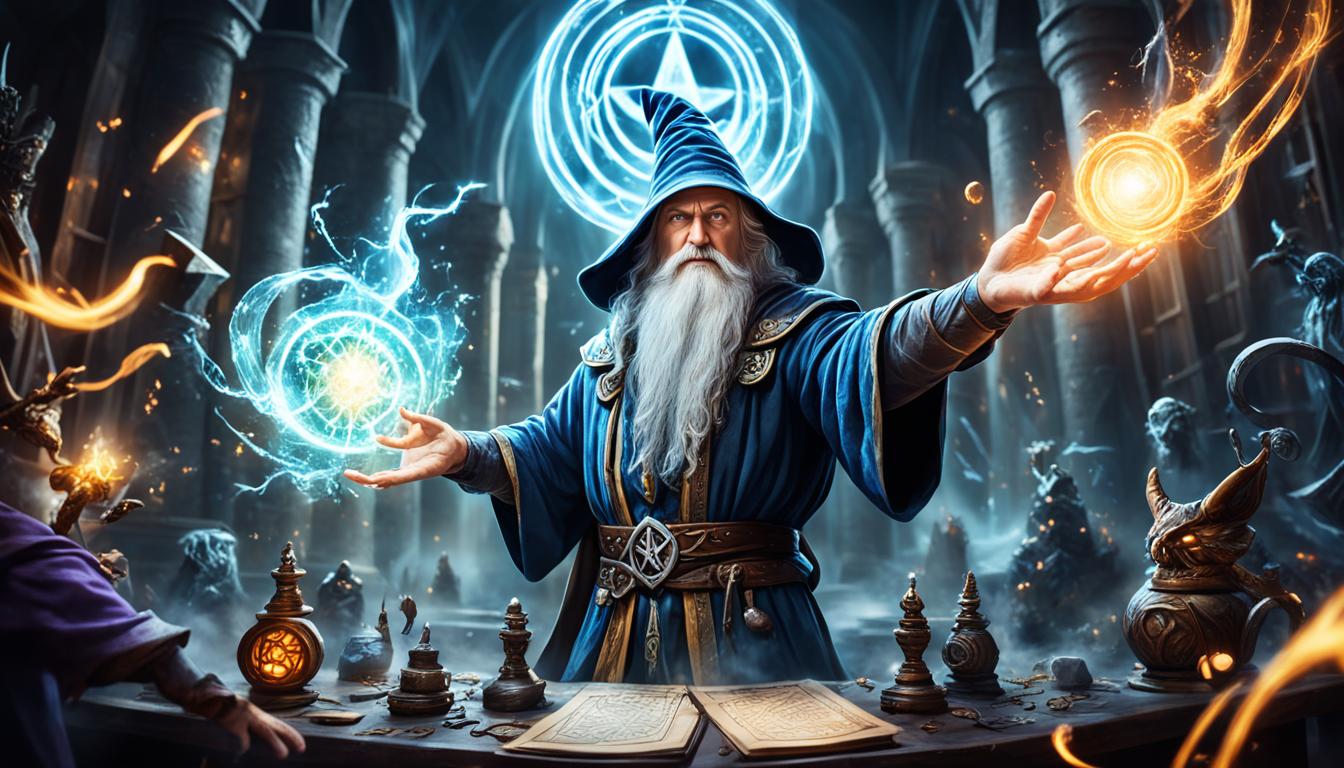Spellbinding Focus: Navigating DND Concentration Rules

Dungeons & Dragons is a game of rules, imagination, and adventure. Among the many mechanics that define the game, concentration stands out as one of the most critical, but the DND concentration rules are often misunderstood. In this guide, we’ll delve into the intricate world of concentration in D&D 5E, helping you understand its mechanics, implications, and how to use it to your advantage.
Key Takeaways
- Concentration ends on a taking damange (on a failed saving throw), when casting another concentration spell, or when you are incapacitated or killed
- You can voluntarily end concentration
- The DC for a concentration saving throw is the higher of 10 or half the damage taken rounded down.
What is Concentration in D&D 5E?
In Dungeons & Dragons 5th Edition, concentration is a vital mechanic that comes into play when a character casts a spell that has a “Concentration” tag. When a spellcaster maintains concentration on a spell, they must focus their attention and magical energy on that spell. This means that they can only concentrate on one spell at a time.
Why Does Concentration Matter?
Concentration matters because it adds a layer of strategy and challenge to spellcasting. It prevents spellcasters from stacking multiple powerful spells simultaneously, which would otherwise unbalance the game. It also makes spellcasting a dynamic and tactical choice during combat.
When Does Concentration End?
In Dungeons & Dragons Fifth Edition, concentration on a spell ends under the following circumstances:
-
Casting Another Concentration Spell: If you cast another spell that requires concentration, the concentration on the previous spell ends. You can only concentrate on one spell at a time.
-
Taking Damage: If you take damage while concentrating on a spell, you must make a Constitution saving throw to maintain concentration. The DC for the saving throw is equal to half the damage taken or 10 (whichever is higher).
-
Being Incapacitated or Killed: If you become incapacitated or die, you lose concentration.
-
Voluntarily Ending Concentration: At any time, you can choose to end concentration on a spell (no action required).
How to Improve Your Concentration Saving Throws
Several factors can improve a character’s concentration saving throws in Dungeons & Dragons Fifth Edition. Here are some ways to enhance your chances of maintaining concentration:
-
Constitution Modifier: The Constitution modifier is added to the Constitution saving throw when attempting to maintain concentration. Characters with a higher Constitution score and modifier will have an advantage in making these saving throws.
-
War Caster Feat: The War Caster feat provides specific benefits related to concentration, including advantage on Constitution saving throws to maintain concentration. It also allows you to perform somatic components of spells even when both hands are occupied and cast spells as opportunity attacks.
-
Resilient Feat: Taking the Resilient feat for Constitution can improve your Constitution score and proficiency in Constitution saving throws, providing an additional bonus to concentration saves.
-
Lucky Feat: The Lucky Feat allows you to reroll saving throws by spending a luck point. This allows you to boost a bad concentration saving throw up to three time per day.
-
Items and Spells: Certain magical items or spells may provide bonuses to Constitution saving throws or enhance concentration checks. For example, a potion or magical item might grant advantage on concentration saves.

Magic Items That Help Maintain Concentration
-
Ring of Spell Turning This ring has a chance to reflect spells back at the caster, potentially preventing the need for concentration saving throws.
-
Cloak of Displacement This cloak grants disadvantage to attackers’ attack rolls, making it harder for them to hit you and reducing the likelihood of taking damage that could break concentration.
-
Amulet of Health Increasing your Constitution score directly improves your Constitution saving throws. An Amulet of Health sets your Constitution score to 19, providing a +4 modifier.
-
Belt of Dwarvenkind This belt increases your Constitution score by 2 (and your maximum to 20), providing a +1 modifier. It also grants advantage on saving throws against poison and resistance to poison damage.
Tips for Effectively Using Concentration Spells
Prioritize Your Spells: Since you can only concentrate on one spell at a time, choose your concentration spells wisely. Consider spells that provide ongoing benefits or control the battlefield. Spells like “Haste” or “Slow” can have a significant impact on combat.
Stay Out of Harm’s Way: If you’re concentrating on a crucial spell, position yourself strategically to minimize the chances of taking damage. Staying in the backline or behind cover can help.
Protect Your Concentration: Be aware of the enemies who can disrupt your concentration. Some creatures have abilities that specifically target spellcasters, so keep an eye out for these threats and prioritize them if possible.
Boost Your Constitution: The Constitution modifier affects concentration saving throws. If you’re a spellcaster who frequently concentrates on spells, consider increasing your Constitution score or using items that grant bonuses to Constitution.
Use Buff Spells: Buff spells that grant temporary hit points or bonuses to AC can help you survive and maintain concentration. Spells like “Mage Armor” or “Shield” can be invaluable for this purpose.
Coordinate with Your Team: Communication with your party members is essential. Let them know when you’re concentrating on a spell, so they can try to protect you or help you maintain concentration.
Plan Your Actions: Consider the timing of your concentration spells. Some spells work best when cast at the beginning of combat, while others are more effective when used strategically during a battle.
Conclusion
Whether you’re a seasoned spellcaster or a fledgling adventurer, the ability to navigate and utilize concentration adds layers of strategy and excitement to every encounter. Prioritize your spells wisely, protect your concentration with vigilance, and harmonize with your fellow adventurers to create truly magical moments.
May your spells be cast with wisdom, your concentration be unbroken in the face of danger, and your adventures filled with the wonders that only a master of magic can unfold.
FAQ
How to calculate the DC for a concentration saving throw?
The DC for a concentration saving throw in Dungeon & Dragons fifth edition is 10 or half the damage taken (rounded down), whichever is higher.
Can concentration end on someone else’s turn?
If any of the conditions occur that break concentration your concentration is broken regardless of which players turn the condition occurred on.
Can I concentrate on more than one spell at the same time?
In Dungeons & Dragons Fifth Edition, a character cannot concentrate on more than one spell at the same time. If you attempt to cast another spell that requires concentration, the concentration on the first spell ends.
Can I maintain concentration during a rest?
A character can maintain concentration on a spell during a short rest in Dungeons & Dragons Fifth Edition. Short rests typically last at least 1 hour, and during a short rest, characters can engage in various activities such as tending to wounds, catching their breath, or engaging in light activity. If a character chooses to cast another concentration spell during the short rest, they will have to end the concentration on the current spell, as concentration can only be maintained on one spell at a time.
Can I move and attack while concentrating on a spell?
A character can move and attack while concentrating on a spell, unless the spell’s description or specific conditions indicate otherwise. Concentration doesn’t prevent a character from taking regular actions like moving or attacking.
Can I cast a cantrip while concentrating?
Cantrips are considered simple spells that characters can cast at will, and they do not require concentration. Concentration is typically associated with more powerful spells, and the rules allow characters to cast cantrips freely without affecting their concentration on other ongoing spells.